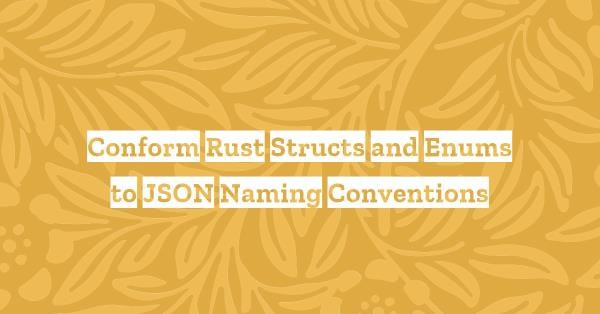
Rust Random Topics - #001
The Problem
In Rust, the naming convention for variables and struct fields is CamelCase for types and camelCase (with a lowercase first letter) for variables, fields, and function names. However, the JSON standard and many other programming languages and frameworks prefer using snake_case for object keys. When Rust structs or enums are serialized to JSON without any adjustments, their camelCase field names would be directly used as JSON keys, potentially leading to inconsistency with common JSON naming conventions.
The Solution: #[serde(rename_all = "snake_case")]
The #[serde(rename_all = "snake_case")] attribute tells Serde to automatically convert all the field names from camelCase to snake_case during serialization (and the reverse during deserialization). This allows Rust developers to stick to Rust's naming conventions while still adhering to the common JSON naming standards.
Example
Let's consider a simple example to illustrate the practical effect of this attribute.
领英推荐
Without Using #[serde(rename_all = "snake_case")]
#[derive(Serialize, Deserialize, Debug)]
pub struct User {
pub userName: String,
pub userAge: u32,
}
// Serialized JSON: {"userName":"John Doe","userAge":30}
In this case, the JSON keys userName and userAge retain the camelCase naming from the Rust struct.
With Using #[serde(rename_all = "snake_case")]
#[derive(Serialize, Deserialize, Debug)]
#[serde(rename_all = "snake_case")]
pub struct User {
pub userName: String,
pub userAge: u32,
}
// Serialized JSON: {"user_name":"John Doe","user_age":30}
Here, the #[serde(rename_all = "snake_case")] attribute modifies the serialization behavior, and the JSON keys are automatically converted to user_name and user_age, adhering to the snake_case convention.
Conclusion
The #[serde(rename_all = "snake_case")] attribute is a simple yet powerful tool for ensuring your Rust structs and enums can seamlessly integrate with JSON-based systems and conventions, making your code more interoperable and consistent with widespread JSON naming practices. It simplifies serialization and deserialization processes by automatically handling the naming convention translation between Rust and JSON.